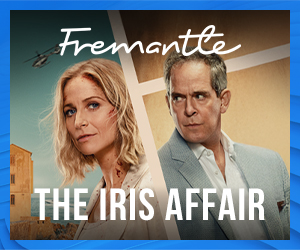
Indonesian director Timo Tjahjanto talks about fear, horror, musicals, laughs lost in translation and the difference that streaming has made to his life as a filmmaker.
Best known for his work in action and horror, Indonesian filmmaker Timo Tjahjanto jumped into new territory with comedy, "The Big 4", produced by Frontier Films, which is part of Indonesia’s Screenplay Films’ cluster.
Less than two weeks after its 15 December 2022 premiere, the Netflix original rose to #1 spot on the streamer’s global top 10 list for non-English films with almost 20 million hours viewed for the week, and Rotten Tomatoes was calling it “definitely one of the best action films of the year”. Over its three weeks on Netflix’s top 10, the film was watched for a total of 41.6 million hours around the world, and appeared on the top 10 lists in 65+ countries.
"The Big 4", written by Tjahjanto and Johanna Wattimena, is about a by-the-book detective who investigates the death of her father and follows a clue to a remote tropical island, only to find out his true identity as a leader of a group of assassins.
Tjahjanto frequently collaborates with Kimo Stamboel, whom he met at college in Australia; the filmmaking duo are known as ‘The Mo Brothers’. Together, they have made films such as "Rumah Dara" (also known as "Macabre"), "Killers" and "Headshot".
You’re well-known for making horror films and darker stories. What motivated you to make "The Big 4", which is a much lighter story? “It’s part of me trying to improve as a filmmaker because I think a great filmmaker can sometimes be a person who’s really good at making one specific thing, but another type is also one who is not afraid of doing something unfamiliar. People have asked me if I am thinking about making a musical one day and I say, why not? I watched [Indian feature] RRR and it was awe-inspiring, as well as the latest Matilda remake from Netflix. Yet, I would say my urge for violent content is too strong. For example, this next [as yet unnamed] project with Netflix is going to be a darker piece.”
Comedy is a huge part of "The Big 4" and humour is difficult to translate. When you were scripting the fi...
Indonesian director Timo Tjahjanto talks about fear, horror, musicals, laughs lost in translation and the difference that streaming has made to his life as a filmmaker.
Best known for his work in action and horror, Indonesian filmmaker Timo Tjahjanto jumped into new territory with comedy, "The Big 4", produced by Frontier Films, which is part of Indonesia’s Screenplay Films’ cluster.
Less than two weeks after its 15 December 2022 premiere, the Netflix original rose to #1 spot on the streamer’s global top 10 list for non-English films with almost 20 million hours viewed for the week, and Rotten Tomatoes was calling it “definitely one of the best action films of the year”. Over its three weeks on Netflix’s top 10, the film was watched for a total of 41.6 million hours around the world, and appeared on the top 10 lists in 65+ countries.
"The Big 4", written by Tjahjanto and Johanna Wattimena, is about a by-the-book detective who investigates the death of her father and follows a clue to a remote tropical island, only to find out his true identity as a leader of a group of assassins.
Tjahjanto frequently collaborates with Kimo Stamboel, whom he met at college in Australia; the filmmaking duo are known as ‘The Mo Brothers’. Together, they have made films such as "Rumah Dara" (also known as "Macabre"), "Killers" and "Headshot".
You’re well-known for making horror films and darker stories. What motivated you to make "The Big 4", which is a much lighter story? “It’s part of me trying to improve as a filmmaker because I think a great filmmaker can sometimes be a person who’s really good at making one specific thing, but another type is also one who is not afraid of doing something unfamiliar. People have asked me if I am thinking about making a musical one day and I say, why not? I watched [Indian feature] RRR and it was awe-inspiring, as well as the latest Matilda remake from Netflix. Yet, I would say my urge for violent content is too strong. For example, this next [as yet unnamed] project with Netflix is going to be a darker piece.”
Comedy is a huge part of "The Big 4" and humour is difficult to translate. When you were scripting the film, were there certain things you kept in mind knowing that the film would ultimately screen on a global platform? “A lot of the humour in "The Big 4" is improvisational because two of the actors are actually stand-up comedians. Subconsciously, I’m always thinking, ‘this is so funny’. As an Indonesian, you’ll laugh. But this might not translate well to some white guy in Mississippi, for example, because it’s such a cultural thing. It’s just the risk of trying to do comedy. A lot of comedy comes from the fact that it is such a local thing, a trend of the moment or a folklore. For example, one of the characters in "The Big 4" swears in a way that only people from eastern Indonesia will understand. So that will definitely be lost in translation.”
Indonesia is a high-interest market for many streamers. Has the number of projects actually exploded for you in the last few years, or is it just a lot easier to find money to make stories now? “The biggest challenge was always – before Netflix and other streaming services – when you have an idea but you don’t have the faith of investors or studios. They’ll say, “this is just not really what the audience wants”. But you never know when you don’t try. I think Big 4 is pretty commercial, but let’s say for example, Indonesian films like Photocopier or Dear David. I think those are very interesting offerings that you will never get in the cinemas. Photocopier is so thematic in terms of what’s happening nowadays... Streaming services allow these kinds of stories to be told, where in a million years, unfortunately, we will not see [these] in the cinema, especially in Indonesia. Right now, the only things that are doing well theatrically are horror films and romantic comedies. I’m optimistic that with streaming services, we have a good future.”
Are you hoping for hybrid theatrical/streaming distribution for your movies, with short windows or festival premieres before streaming releases? “Of course. As a filmmaker, you always dream that your film is going to be shown theatrically because that’s the whole experience. But I have to think about all the advantages that I didn’t have before. My previous films have been distributed worldwide, but the distribution itself is such a painful process. Let’s say, my first film, horror feature Rumah Dara (2009). People buy it for Argentina, then Mexico, Malaysia and every deal is different. With The Big 4, the moment it came out, people were reacting to it in real time. I think that’s the beauty of [streaming]. I remember when The Night Comes For Us (2018) first came out, there was a video of a whole dorm of college boys watching together and they were all screaming and holding beers. That’s the kind of experience that you want.”
You’ve had a very international career, with projects in Hollywood and also a "Train to Busan" remake in progress. In a sense, the whole world is open for you; how are you choosing your next few projects? “I do have several Hollywood-based projects in development but it is important for me to keep my collaboration with Netflix going. The Big 4 isn’t the end of it; I have more stories to tell from these characters. It’s just the beginning. Netflix is in a sense, like, ‘whenever you want to rock and roll, let’s do it’. The same goes for this project that I’m about to do. The collaboration process has been really encouraging, creatively, so I don’t want to let go of that. But I do have these American projects where I feel it’s a good proving ground because I don’t want to be comfortable just making Indonesian films. I want to do something I’ve never been able to do before, like making a film in Hollywood. I’ve been through some preparations with them and the way they do things is very different. I think that’s what you have to be as a filmmaker – constantly learning.”
Do you think film is the best format for you to tell the stories you want to tell right now, or do you think you might move into episodic formats? “I am interested and we do have one project that Netflix Indonesia is slowly developing – a thriller series. But right now, I feel the level of commitment that is required for a film is less demanding than doing a series because a series is a lot of responsibility.” – by Sara Merican





























